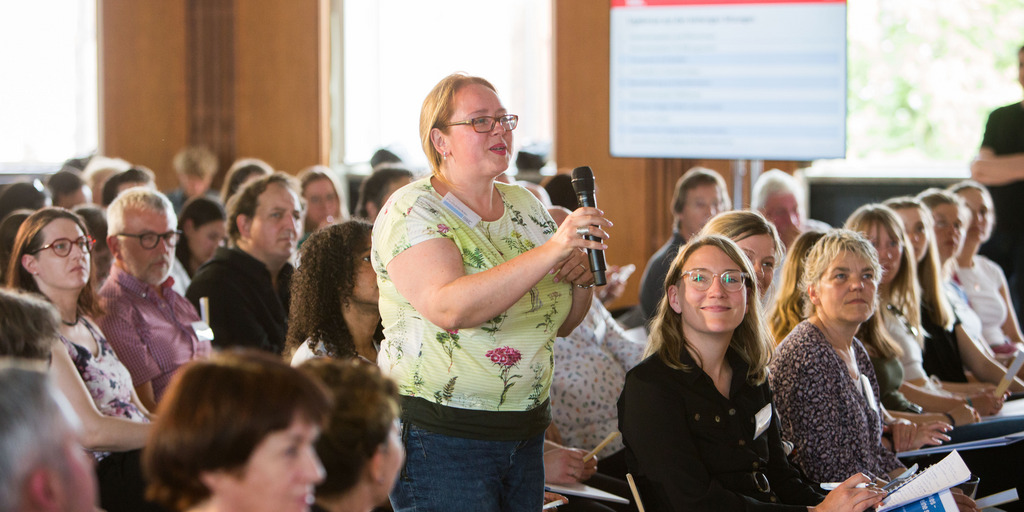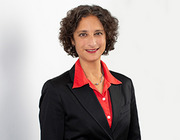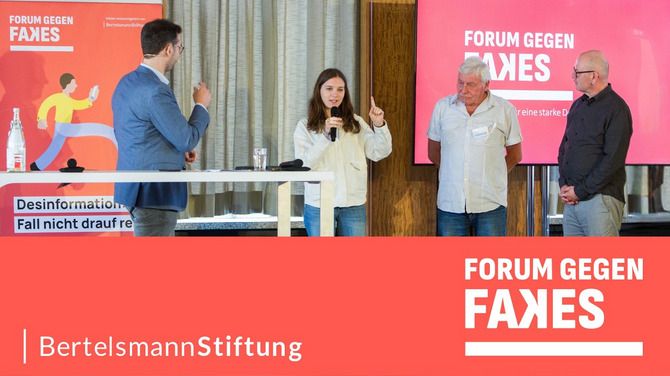How can we defend ourselves and our democracy against fakes and manipulated information? Citizens took part in a unique participation scheme to find answers to this question. Two different kinds of citizen participation were combined to ensure that as many people as possible were involved and that the best possible results would be achieved: in one part of the scheme, the entire population was invited to contribute, and in the other a Citizens’ Panel with participants selected at random. In a broad online process, citizens were able to put forward and vote on proposals. Based on these proposals, the Citizens’ Panel then devised provisional recommendations, collected online feedback from the general public and developed final recommendations for action and measures for better ways of dealing with disinformation for policymakers, the media, businesses and civil society.

© Sebastian Pfütze
Germany goes to the polls: How can we combat disinformation?
In the Bertelsmann Stiftung’s project “Forum against Fakes. Together for a strong democracy”, more than 120 citizens have devised 15 recommendations and 28 measures for dealing with disinformation. Now everyone in Germany is invited to vote on the results.
Content
The online participation in the Forum against Fakes has ended.
Many thanks to everyone for taking part!
The results will now be incorporated into the citizens' report. Updates will follow!
Forum against Fakes: citizens approve recommendations for dealing with disinformation
The Citizens’ Panel “Forum against Fakes” compiled its final results at its fifth meeting, which took place in Berlin from 24. – 26. May. The bright sun blazed down on the Kronprinzenpalais venue in the Berlin district Mitte, but the participants were sweating mainly because of the intensity of the discussions and group work. Once again, this exchange of ideas was constructive, respectful and enthusiastic. Some discussions were controversial and compromises had to be found. The diversity of the participants enhances the quality of the Citizens’ Panel’s results and assure its place as a central anchor of the Forum against Fakes. There was an emotional atmosphere on the last day, as this marked the end of the intensive work phase on the Citizens’ Panel. All citizens – if they receive an invitation – will take part in a Citizens’ Panel again!
Film in german
Picture Gallery
Forum against Fakes – the first of its kind: A unique participation process
In the Forum against Fakes, more than 120 citizens from all over Germany worked together to devise recommendations on how to deal with disinformation. A particular feature was the diversity of the participants and the differences between their views. Participants come from every federal state, from small villages and big cities, and the mixture of gender, age, level of education and migration background is a fair reflection of the diversity of German society. The work of the Citizens’ Panel has already been connected with the general public via broad-based online participation at two points: once in February, when ideas and assessments were gathered in order to determine the topics, and again in April with feedback on the provisional recommendations of the Citizens’ Panel. The third point of contact was the release of the final results of the Citizens’ Panel on 5. June for the subsequent online poll.
There has never been a process like this in Germany before. We’ve shown that it’s possible to activate a broad section of society to participate in the policymaking process. We very much hope that this method will become more and more common.
Dr Angela Jain, democracy expert at Bertelsmann Stiftung
The highly diverse group that made up the Citizens’ Panel discussed the processed results of the online participation scheme and dealt with the most important points. The participants could rely on the support and advice of experts during every phase.
The citizens have gained an impressive amount of further expert knowledge since the first meeting.
Dr Anja Zimmer, media expert and lawyer, expert advisor for the citizens’ discussions in the Forum against Fakes
The result of a long participation process: 15 concrete recommendations and 28 measures for dealing with disinformation
The recommendations are now in the hands of politicians, the media, businesses, scientists and civil society, but every individual’s sense of responsibility also plays a vital role when dealing with disinformation. One overriding point is clear: it is difficult to resolve the tense conflict between freedom of expression on the one hand and the suppression of disinformation on the other. The keys elements here are education and media literacy, which should not only be compulsory in schools, but also made available at all levels of society.
The Citizens’ Panel calls for all available resources to be mobilised to ensure that disinformation and AI-generated content are labelled, and to stem the rising tide of disinformation. This requires – among other measures – an independent reporting body where citizens and journalists can ask for advice on disinformation or have it checked and rectified. Internet platforms will also have to assume responsibility: they will be obliged to amend their design so as to encourage the declaration of the sources of their images and quoted facts. Algorithms should ensure that content which shows signs of disinformation is not published. Platforms should be obliged to invest 1 percent of their annual global earnings in the fight against disinformation. Quality journalism should be encouraged through support for the publication of its own educational articles on the effects of disinformation, and by the creation of a voluntary, transparently administered and designed “quality seal”.
Ultimately, users can also do a lot themselves, provided that there is increased awareness of and targeted education about disinformation – and a more conscious handling of potentially anti-democratic content posted and shared on social media.
Forum against Fakes: What comes next?
Between 5. June and 2. July, the final results of the Citizens’ Panel will be put to the online vote to identify the TOP 3 recommendations for action. The results of this poll will then be summarised in a Citizens’ Report, which will be submitted to Minister Nancy Faeser at the Federal Ministry of the Interior and Community on 12. September 2024.
Materials
Additional information:
The project “Forum against Fakes – Together for a Strong Democracy” is run by the Bertelsmann Stiftung in cooperation with the Federal Ministry of the Interior and Community (BMI), Stiftung Mercator and the Michael Otto Foundation for Sustainability. In addition, the project is supported by the t-online news portal, the initiatives #UseTheNews and “Deutschland Sicher im Netz e.V.” and the project advisory board.
It combines broad online participation with a diverse citizens' assembly in an innovative way. Since the first meeting in Berlin on 15 March, 120 citizens representing society’s diversity have been intensively exchanging ideas with each other as well as with experts from science and practice.




![[Translate to English:] Gruppe vor Banner](/fileadmin/files/_processed_/2/1/csm_26.5.2024_BMST_FgF-4174_c5828346e0.jpg)





